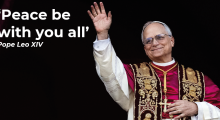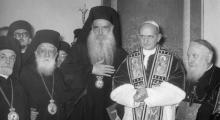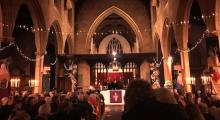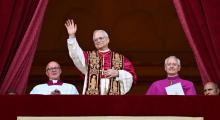Issued by the Catholic Center for Studies and Media - Jordan. Editor-in-chief Fr. Rif'at Bader - موقع أبونا abouna.org
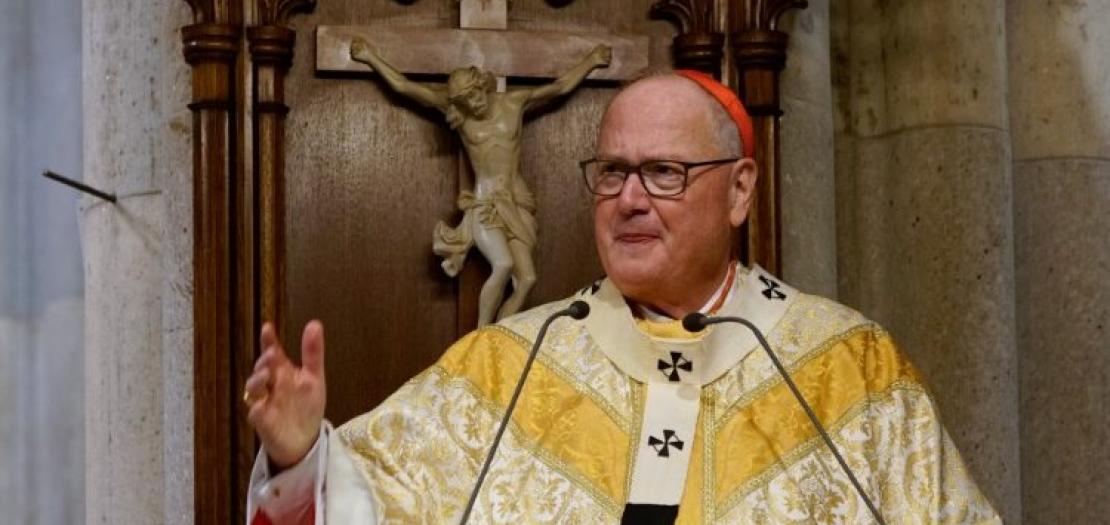
Cardinal Timothy Dolan, Archbishop of New York, is stopping through Rome on his way to the Ukrainian border nations of Poland in his capacity as Chair of the Catholic Near East Welfare Association (CNEWA). During his travel to Rome, for the first time since the outbreak of the pandemic, he sat down with Vatican News, to discuss his upcoming visit to meet with suffering Ukrainian refugees. Since the outbreak of the war, more than 5 million Ukrainians have been forced to flee their homes and millions more have been displaced within the country.
In this interview, he discusses whether the war and whether he is fearful it may expand, as well as the power of Pope Francis’ appeals for peace and how the Pope’s voice resounds across the United States. He also tells Vatican News about the upsurge in violence in New York, especially in the wake of the pandemic, reflects on how abortion legislature is changing throughout the country, the beautiful faith of New York’s Hispanics, and his hopes this Easter season.
Vatican News: Your Eminence, welcome back to Rome after 25 months. While you are busy here with the Papal Foundation and at the Pontifical North American College where you served as rector for its annual Rector’s Dinner, what has really brought you this time to Europe?
Cardinal Timothy Dolan: My trip to Rome now is the ‘antipasto’ for my trip to the border countries of Poland, Slovakia, Hungary and possibly across the border to Ukraine. I go there, first of all, out of a sense of duty, because the Archbishop of New York happens to be ex-officio, the chairman of the board of a great organization called the Catholic Near East Welfare Association, CNEWA, which was founded a century ago by Pope Pius XI to assist our beloved Eastern right Catholics, who very often live in persecuted areas and often are under great stress. In the Middle East, India, Ukraine, and in Central and Eastern Europe, there are many Eastern Rite Catholics. We are very active, having boots on the ground, and wish bring them alms, the gifts that Catholic people have given us to help these people. We want to just embrace them and say, we love you. We have not forgotten about you. We want to pray with you, encourage you and help. I will then go to Poland, which has just so heroically welcomed millions of refugees, and Hungary and Slovakia which have done the same, along with others. We're gearing up, by the way, in the Archdiocese of New York.
Vatican News: How so?
Cardinal Timothy Dolan: Our renowned Catholic Charities has a great track record of welcoming immigrants and refugees. We're getting ready. There's a bit of a difference this time, because refugees from Ukraine, want to go back home and are saying, ‘well, maybe this war will be over and maybe we'll be able to go back home.’ The longer it goes on, the more they say we're probably going to have to go somewhere for a while until our beloved country is rebuilt. That just compounds the tragedy, doesn't it?
In the midst of tragedy, aggression and separation, I'll see it face to face their resilience, hope, and determination. We have observed this from the distance. You know that we're going to get through this. And right now, it's a struggle. Right now, it's like that darkness and earthquake of a Good Friday. But we know that Easter's going to come. They're going to teach me that.
Vatican News: What value, Cardinal Dolan, do you give Pope Francis's appeals for peace?
Cardinal Timothy Dolan: They've had tremendous value. First of all, they've gotten a lot of coverage in the United States. The Pope's moral voice has been very strenuous and very effective. And you know what? I think he's been part of helping the world discover that this is a moral issue, one of oppression of vulnerable people, of an abuse of power, of unprovoked and illicit use of violence and military force. He's helped us understand this. Pope Francis has an understanding that this is cultural, not just economic. It's not just about land. The people of Ukraine have a proud, vibrant culture that even though some of it is shared with its neighbouring countries, including Russia, it's independent, autonomous, historic, deeply ingrained, and it cannot be crushed or taken over by any other culture. Even if that culture says "you're the same as us, we're absorbing you, drop it."
When I'm at home, when I go on news programs, they will unfailingly say, "we didn't know Ukraine was such a believing country, so faithful." Every scene we see of houses destroyed, we see crucifixes and images of the Blessed Mother. We always see churches in the background. We always see at the funerals, the priests. We always see the people at prayer. We always hear the people praying. Nor do they know that the Orthodox Church in Russia has been so historically strong. The Pope has helped us understand the spiritual value here of prayer and how faith and hope are getting people through.
Vatican News: There’s a certain tension between the United States and Russia at this time. Do you believe or do you have any fear that the war could expand?
Cardinal Timothy Dolan: Oh, I'm afraid it is. Russia has always historically had its eye on nations beyond the Russian borders. If you know your history, you would see that their desire for land beyond has been very, very strong. Why Russia, which has to be the biggest country in the world, would want more land is beyond me. When you look back to the detente 1989, the fall of the Berlin Wall, the collapse of the Soviet Union, thanks be to God, we kind of took a deep breath and said, maybe we'll have an era of peace. For a time, it seemed that way.
These ancient horrors, these ancient tyrannies have risen up again. Pope Francis has helped us understand this. We naively thought that there was no real evil in the world. You might see every once in a while, some vestiges of systematic evil. But in general, everybody knows the power of raw evil, objective evil, in the sense that this is not right. It's like the world understands us. Everybody but Putin understands this, and his generals. This is objectively wrong. We have to be careful in the United States. It's not that we don't do mea culpas. As we look back on our history, we've fallen into this too. It doesn't work. It's counterproductive. We should all learn from that history that there is raw evil in the world. As Pope Francis has suggested, if we don't get back to God's Law, if we don't get back to right and wrong, if we don't get back to biblical values, this is going to haunt us forever.
Vatican News: Speaking about evil, but perhaps on a more local level, or rather difficulties even in the city of New York, there was that terrible subway shooting recently in the city. We've seen other acts of violence. Cardinal, could you tell us why you believe there has been this upsurge in the city and how is the city also doing since the pandemic?
Cardinal Timothy Dolan: I'm afraid you're right. This is it's very haunting for us in New York and other American cities where violence and crime seem to be on the uptick. Obviously COVID didn't help. The extremities of COVID--the isolation, emptiness of streets, desperation of people--all intensified some of the crime and violence. I don't think we can minimize the power of evil here. It's complicated whenever you're dealing with the problems of crime. We have to maturely and realistically look at poverty and at mental illness. But we also maturely and realistically have to look again at raw, blatant evil. There are people who thrive on violence. There are people who just want to wreck and destroy and steal and take lives. We have to conclude this. We're not naive. We believe in good law. We agree with prudent law enforcement. We know that you have to be strict with these crimes. Some of that, I'm afraid, tapered off.
There's always a beautiful balance that you have to have when dealing with social injustices that could lead to crime, poverty, homelessness, quite often division and tension within families, and raw evil and sin. If you stress either one too much, you're going to have problems. I worry in recent years, we may have stressed that first and forgotten about the duty we have to protect people for a for a secure and safe environment. That does mean that you support your police, that you have strict laws without ignoring the other factors contributing to this crime.
Vatican News: Speaking about lives and protecting people, there's a movement within the United States, even in terms of legislature, working to on the one hand let states decide that they will not force religious structures to provide abortions, and setting limits on late-term abortions.
Cardinal Timothy Dolan: Another balance. So, we always have to look we always have to look to the health needs of the woman, and have to make sure that a woman, especially a pregnant mother, has the healthcare and support she needs and which would extend into after the baby's born. All right. But sometimes the emphasis on the health care of women has seen the mortal complication for the other side, namely the baby in the womb. For us, it's “both” “and.” We love the mom. We love the baby. It's a "both” “and” thing. It's not an "either." The pro-abortionists would make it an “either” “or.” For them, it's the mom at all costs. Forget the baby and we can't do that. I would welcome and, I for one, would rejoice in some of the new laws that are protecting the civil rights of the unborn baby. This is a human rights issue. This isn't a religious issue. This is a human rights issue, a civil rights issue. We say we are founded on the right to life and we are founded to the equal protection of law in our Constitution. And the baby in the womb doesn't have that equal protection of the law. And he and she, he or she needs that.
Vatican News: On the federal level, what reaction do you have to the legislation that is trying to remove restrictions limiting abortions at state levels?
Cardinal Timothy Dolan: Before the Supreme Court as we speak, we're waiting for the Dobbs case, which is the very constitutionality of Roe v Wade, which allows the unrestricted abortion license, which we're hoping is tempered, if not eliminated. That's the biggie coming up.
But, in different states, there are in my mind very wise laws that would restrict an unrestricted access to abortion. There has not been any state that has restricted the right to abortion totally, but there would be welcome legislation that has defended the life of the baby in the womb after a certain number of months of pregnancy. That is very good.
Vatican News: In terms of looking at other human rights and the dignity of people and thinking about also the pope's attention to migrants and refugees and people who have found new lives for themselves. The United States is a country of immigrants. In New York, you have a very large Hispanic speaking community and also in throughout the country. But if you could just maybe speak about sort of a general sense of the situation of the Hispanic community in New York and how the church is close to them?
Cardinal Timothy Dolan: Well, the Church is not close to them. The Church is them. I'm glad we have an office for Hispanic ministry, but that's our duty. They are the church. It's not like they're a segment of the Church. somebody said once, “What are you doing about the Hispanic problem?” I said, “problem? It's a gift. It's not a problem.” Are there certain challenges? Sure, there are. But that is the case for any group. I'm a historian of the Catholic Church in the United States and its beautiful to see the progress of peoples. It is beautiful to see the last almost 200 years where immigrants to the United States were still able to proudly protect their unique characteristics while becoming a full part of the Church in society. American culture is a beautiful, beautiful assimilation. When I go obviously when I go to the Bronx, for instance, I know those are going to be heavily Hispanic areas, and I rejoice in that. But now you know what I'm seeing when I go up north to little farm towns, there's second or third-generation Hispanics who have moved there. They've settled there as had done the Irish, Italians, Lithuanians, Poles and Germans. The Ukrainians will do the same we welcome them.
Vatican News: Your Eminence, this Easter season, amid the turmoil happening around the world, what is your message?
Cardinal Timothy Dolan: In America, there's a great song we often sing “We Need A Little Christmas, right this very moment...” It comes from that musical “Mame” and you'd sing it in tough times. And like how we sing about Christmas, we need a little Easter right this very moment, because we see a lot of darkness, death and violence in the world. I look at my own country, my own city, at the Church at times, and I have to admit, I see some sin, some darkness, and signs of death. We're tempted sometimes to believe as if the world has been reduced to a prolonged Good Friday. And that's why we need a little Easter right this very moment. We all we have to go through this Good Friday individually and communally. But the great news about Easter is that death doesn't have the last word. Easter does. So good is ultimately going to win. Light is going to trump darkness. Hope is going to be victorious over despair. Faith is going to conquer doubt and life will conquer death. We saw that in Jesus and his Father intends that for all of us. And I don't know about you, but we need that Easter message more than ever.



